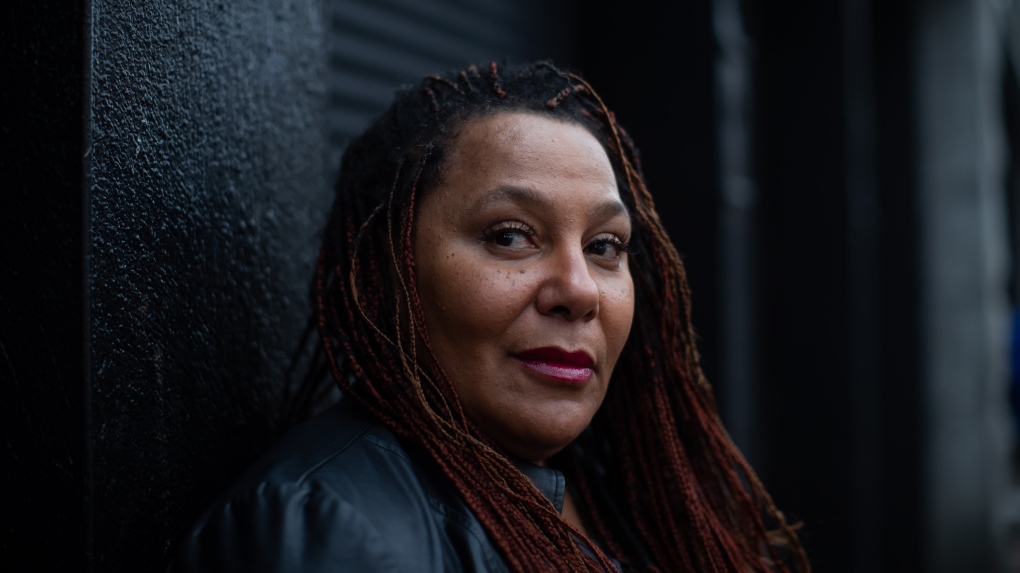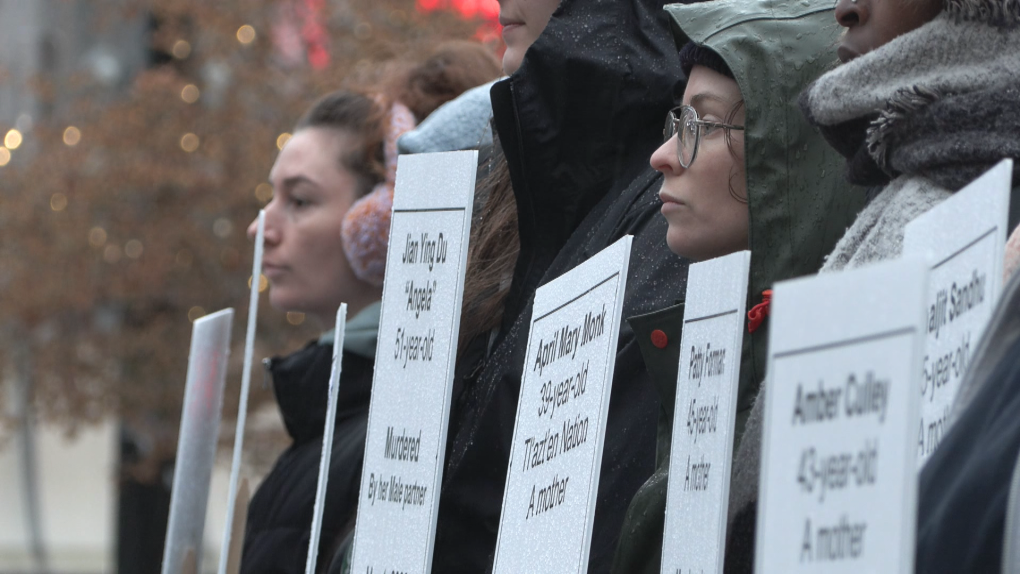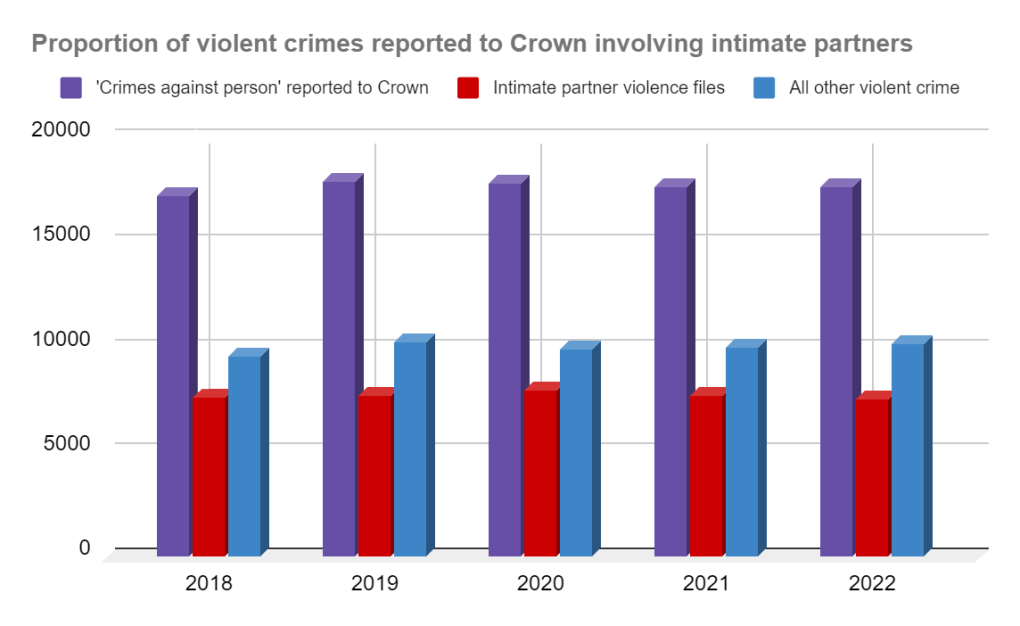Here's what advocates say is missing from the conversation about crime and public safety in B.C.
 Even though it mainly happens behind closed doors, advocates in B.C. say domestic violence is a significant public safety issue. (Image credit: Shutterstock)
Even though it mainly happens behind closed doors, advocates in B.C. say domestic violence is a significant public safety issue. (Image credit: Shutterstock)
Police and politicians in B.C. have been sounding the alarm about a decline in public safety, pledging swift action so people feel safe in their communities. But advocates say the conversation has erased one of the most devastating – and deadly – types of violent crime.
On Oct. 13, a woman was killed in a home in Metro Vancouver in what police described as "an isolated incident between family members." The media release from homicide investigators identified the victim as well as the suspect, who was arrested and charged with second-degree murder.
It did not say the suspect was the victim's husband. It did not say he was facing other intimate-partner-violence-related charges at the time of the alleged murder.
When officials talk about declining public safety, they talk about an increase in street disorder, random assaults, and often petty crimes perpetrated by so-called "repeat offenders" who are out on bail.
They don’t talk about the British Columbians who are victimized in their homes, about the violent crimes that primarily take place behind closed doors and are primarily perpetrated by men against women.
"We do have a certain kind of crime that is surging and we're not talking about it," says Angela Marie MacDougall, executive director of Battered Women's Support Services.
"It is really rendered invisible from the notion of public safety. It feels as if – and it is experienced as if – it is being suppressed in the conversations about public safety," she adds. "It's not isolated. And that is a failing of the notion of public safety, to treat this violence as individual experiences. Efforts to address it in a systemic way are actively undermined while it's being suppressed and treated as these one-offs."
 Angela Marie MacDougall, executive director of Battered Women's Support Services, poses for a photograph in Vancouver, on Tuesday, October 13, 2020. THE CANADIAN PRESS/Darryl Dyck
Angela Marie MacDougall, executive director of Battered Women's Support Services, poses for a photograph in Vancouver, on Tuesday, October 13, 2020. THE CANADIAN PRESS/Darryl Dyck
'NOT A PRIVATE MATTER'
Even though intimate partner violence is pervasive and pernicious, even though statistics and stories have shown how it too often escalates to extreme or lethal levels, even as countless women have seen their lives threatened or transformed by what's been called "everyday terrorism," it goes virtually unmentioned.
"It reflects this ongoing perception of this being a private matter not a matter of public health and safety that is resulting in the death of women across B.C. and across Canada," Amy FitzGerald, the executive director of the B.C. Society for Transition Houses, says.
"Intimate partner violence is not a private matter. It's a public health and safety matter and an epidemic that requires significant financial investment and systemic change to address it."
 Advocates hold a vigil for women murdered in alleged domestic violence incidents in 2022.
Advocates hold a vigil for women murdered in alleged domestic violence incidents in 2022.
So why are police seemingly so reluctant to publicize domestic violence cases the way they routinely do for petty property crimes and random attacks?
In B.C.'s largest city, the Vancouver Police Department says information that a particular incident or crime is a case of intimate partner violence would only be released in "exceptional circumstances."
Spokesperson Sgt. Steve Addison, in an emailed statement, says the decision is a result of the need to ensure victim safety, protect families' privacy, ensure the integrity of an ongoing prosecution and to avoid "unnecessary embarrassment."
Advocates don't buy it – and another policing agency from B.C.'s Lower Mainland has taken a vastly different approach, one that seemingly balances privacy concerns with the need to keep this prevalent public safety threat out of the shadows.
INCREASE IN REPORTED CASES
Organizations like the ones led by MacDougall and FitzGerald have seen a steadily increasing number of reports and requests for support along with an alarming increase in the severity of violence in recent years.
According to national data, only one in five of these crimes gets reported to police. Even so, the number of police reports rose across the country every year between 2015 and 2021.
Police departments do not provide statistics that illuminate the relationship between a victim and the accused. There is no public data that shows the number of assaults, for example, that are cases of intimate partner violence. The same is true for sexual assaults, attempted murders and homicides.
But it is information they can track and could release.
For example, in its annual report on public safety indicators for 2020, the Vancouver Police Department said the amount of domestic violence being reported in the city was unprecedented.
"Intimate partner violence is at an all-time high," the report, issued in February of 2021, said.
"These files are very time-consuming for patrol officers, often consuming an entire shift."
That was the last time it was mentioned by the department in any of its quarterly or annual reports.
A 'STAGGERING PERCENTAGE'
The BC Prosecution Service began releasing statistics about intimate partner violence files in its annual report last year, shedding light on the number of reports they receive from police recommending criminal charges in these cases.
For the past five years, one in five reports submitted to Crown counsel has been an intimate partner violence file. In terms of the actual number of files, the five-year average is 13,221 – which works out to 36 per day if spread across 365 days, according to the 2022/2023 report.

In British Columbia, these files are classified as "K" files if the investigation reveals the victim and accused are or have been in an "ongoing close and personal or intimate relationship," according to BCPS policy.
"Intimate partner violence is different from many other crimes," the policy says, explaining why they are flagged separately.
"It is prevalent in all sectors of society," the policy continues, adding "the degree of violence can be extreme, with one in five homicides in Canada involving the killing of an intimate partner."
"K" files run the gamut of violent crimes, from uttering threats to sexual assault to first-degree murder, but also include other offences like property crimes and breaches of court-ordered conditions.
In the past two years, the proportion of intimate partner violence files reviewed by prosecutors has crept up to 22 per cent, according to the BCPS report.
The proportion gets even more pronounced when looking at crimes against the person, which is the term used to describe violent crimes.
Intimate partner violence files make up 44 per cent of these files, a rate which has remained steady over the past five years.
"That's a staggering, staggering percentage," MacDougall said, pointing out that the majority of these crimes go unreported to police and that the number handled by the prosecution service offers a glimpse at "the sheer volume of intimate partner violence."
NAMING THE VIOLENCE
On Sept. 16, police in Abbotsford responded to a stabbing at a home in the city. The victim sustained life-threatening injuries and the suspect was reported to have serious, self-inflicted wounds.
In an initial media release, authorities said the incident was "targeted" and there was no risk to public safety.
But what came next is something advocates like MacDougall and FitzGerald say was a rare and bold move by a police spokesperson when announcing charges and naming the accused.
"The investigation also uncovered the event to result from intimate partner violence, calling attention to the often serious level of violence unfortunately present in some relationships," Const. Art Stele wrote.
"AbbyPD is steadfast and committed to protecting and supporting victims of intimate partner violence and will continue to work tirelessly on that front."
Stele told CTV News that the decision to release this information was deliberate, and was done in consultation with Crown and with consideration of any potential impact on the victim and the criminal case.
"We just wanted to make sure that the public is aware that there are, unfortunately, some relationships in which people are suffering under this kind of abuse and that they do need to have a voice, have support – not just by the police department, but from friends, family, coworkers, and the public," he said.
"When it is available and wouldn't interfere with any future trauma or investigation, then I do see ourselves as a department opening up more communication on this issue, mentioning and naming of what type of violence we are we are seeing."
THE PROBLEM WITH VAGUE COMMUNICATIONS
Both MacDougall and FitzGerald say the decision out of Abbotsford was a departure from the way police departments usually provide information on these cases and point to news releases about domestic murder-suicides as being particularly frustrating and egregious examples of how vague communications from law enforcement make intimate partner violence invisible.
"The fact that Abbotsford highlighted the prevalence and severity of intimate partner violence is simply reflecting the reality today for many women and girls," FitzGerald said.
"We still have a world where women are being murdered by their male partners at an alarming rate. And that's just a reality."
In July of 2022, homicide investigators announced that they were looking for an "armed and dangerous" suspect named Eric Shestalo after two women were killed at a home in Chilliwack.
"At this time, it is believed Shestalo was known to the victims and the shooting was targeted," the initial news release said.
Five days after the murders, Shestalo was found dead from a self-inflicted gunshot injury, according to a media release from the RCMP, which also identified the victims.
"The suspect and victims were known to each other," it said.
"The victims of this tragic event are 43-year-old Amber Culley and 49-year-old Mimi Kates."
 Mimi Kates and Amber Culley are pictured.
Mimi Kates and Amber Culley are pictured.
What police didn’t say was that Shestalo was supposed to be in court the same day as the killings facing multiple charges of assault and uttering threats to cause bodily harm. That the women were both victims of abuse by Shestalo was something that family members revealed, hoping that they raise some awareness of the devastating impacts of intimate partner abuse.
This case shows a pattern, according to FitzGerald.
"You start seeing family members stepping forward and saying, enough is enough," she said.
"They just feel like their loved ones have disappeared, and nobody really has been held responsible for it, and that there's been no recognition by society of the severity of this violence."
EXCEPTIONAL CIRCUMSTANCES?
The Vancouver Police Department, according to Addison, has no plans to follow Abbotsford's lead and be explicit when a crime is an act of intimate partner violence.
"Unless there are exceptional circumstances, we won’t consider releasing information that could identify a victim of intimate-partner violence, place a victim at further risk of harm, or act as a barrier to that victim, or other victims, coming forward in the future," Addison said in an email.
Asked what would constitute an exceptional circumstance, Addison did not answer, saying "it is difficult to speak in hypotheticals." He also did not respond to questions about why the relationship between the victim and the accused was not revealed in a particular homicide case in the city, which is classified as a "K" file.
He did, however, elaborate on why the department will sometimes say what the relationship was between a victim and a suspect and why they choose not to do so in cases of intimate partner violence.
"Given that there have been a number of high-profile violent stranger attacks that have caused a great deal of public concern and media interest in Vancouver, we typically inform people if a suspect and victim were strangers or if they knew each other," he said in an email.
"However, naming a person charged in a case of intimate partner violence will indirectly identify the victim in almost every case. We believe that is a breach of the victim’s privacy. It could also cause unnecessary embarrassment to a victim, put a person at risk of repeated violence, and be a barrier to other IPV victims seeking help, especially if they believe the police may disclose their personal information."
He noted that intimate partner violence is "vastly" underreported, citing that as a reason not to inform the public about these cases in all but exceptional circumstances.
 Sgt. Steve Addison of the Vancouver Police Department speaks to reporters on Monday, Sept. 13, 2021, following a weekend of violent incidents in the city.
Sgt. Steve Addison of the Vancouver Police Department speaks to reporters on Monday, Sept. 13, 2021, following a weekend of violent incidents in the city.
Advocates say this is a disappointing response, pointing to the fact that there is no policy that prevents or prohibits this information from being shared – and arguing victims should be the ones making the decisions about what information they want to be released or withheld.
"Whatever reason that police have for the way that they do report on intimate partner violence, as well as femicides or killings … what they actively do is suppress it by diminishing and, quite frankly, discounting the violence," MacDougall says.
'NOT A POLICY PRIORITY'
The provincial government, like police, centres a certain kind of crime and criminal in the discussion on public safety.
Concerns over random stranger attacks, street disorder and so-called repeat offenders prompted a range of responses from the province, including an in-depth study that led to the development of an action plan and significant funding to implement it.
David Eby's mandate letters to his cabinet lists "safer communities" as one of his top priorities as premier.
"To address concerns about public safety, both for the people struggling with mental health and addiction on our streets, as well as the feeling that downtown centres are not as safe as they were before the pandemic, we will work with our partners at all levels of government, the justice and health care systems, the non-profit sector, and community leaders to find solutions for this complex challenge facing our province," he wrote in December of 2022.
MacDougall notes that the premier's letters to the minister of public safety, the attorney general, and the parliamentary secretary for gender equity do not mention intimate partner violence, which she says shows that the province is not paying sufficient attention to this issue.
"Intimate partner violence is not a policy priority. If an issue is not a policy priority, then it literally does not get attention," MacDougall says.
The B.C. budget allocates $462 million to spending on public safety, much of which is earmarked to implement the Safer Communities Action Plan.
That plan outlines the steps the province is taking or plans to take to address "a rise in repeat violent offending" in the province. It includes the creation of new teams of police, prosecutors and probation officers dedicated to handling repeat offenders.
Responding to the rise in intimate partner violence is not part of this plan and is not mentioned anywhere in it, and FitzGerald notes that the phrases "intimate partner violence," "domestic violence" or "family violence" can’t be found anywhere in the budget documents.
The omission is both glaring and galling considering the scale of the problem, according to FitzGerald.
"If you had this many people being the victims of other types of crimes we would have a task force overnight, full-time dedicated prosecutors, full-time dedicated courts," she said.
"It would be a complete all hands on deck."
CTVNews.ca Top Stories

Canada crashes out of world juniors in quarterfinals for second straight year
Canada has been eliminated from the world junior hockey championship with a 4-3 loss to Czechia in the quarterfinals.
Pickering pausing in-person meeting due to alt-right threats, mayor says
Pickering Mayor Kevin Ashe says the city is pausing all in-person meetings, moving them to a virtual format, for the time being due to “alt-right” threats.
Athabasca 'chop shop' bust yields millions in stolen vehicles, heavy equipment: RCMP
RCMP have made what they call a "major recovery" of stolen property in Athabasca.
2 dead and 18 injured in Southern California plane crash
Two people died and 18 were injured Thursday when a small plane crashed through the roof of a sprawling furniture manufacturing building in Southern California where at least 200 people were working, police said.
Toys "R" Us Canada closing 5 stores, expand HMV and add play spaces to some shops
Toys 'R' Us Canada says it is closing five Ontario stores and revamping several others as it works to 'optimize' its business.
Wayne Osmond, singer and guitarist for The Osmonds, is dead at 73
Wayne Osmond, a singer, guitarist and founding member of the million-selling family act The Osmonds, who were known for such 1970s teen hits as 'One Bad Apple,' 'Yo-Yo' and 'Down By the Lazy River,' has died. He was 73.
Grieving orca mother Tahlequah carries dead baby for the second time
The famous mother orca who made waves around the world for carrying her dead calf for 17 days has suffered another tragic loss.
Former Liberal cabinet minister Marco Mendicino won't seek re-election
Marco Mendicino, a prominent Toronto member of Parliament and former minister of public safety and immigration, won't run in the next federal election, CTV News has learned.
U.S. soldier shot self in head before Cybertruck exploded outside Trump's Las Vegas hotel, officials say
The highly decorated U.S. army soldier inside a Tesla Cybertruck packed with fireworks that exploded outside Trump International Hotel in Las Vegas shot himself in the head just before detonation, authorities said Thursday.

































